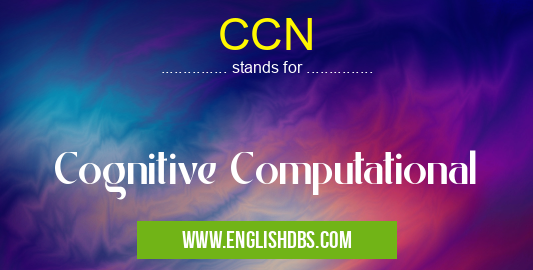What does CCN mean in COMPUTING
CCN is a field of neuroscience that investigates the cognitive processes of the human brain using computational models. By combining cognitive psychology, neuroscience, and computer science, CCN researchers aim to understand how the brain processes, stores, and retrieves information.

CCN meaning in Computing in Computing
CCN mostly used in an acronym Computing in Category Computing that means Cognitive Computational
Shorthand: CCN,
Full Form: Cognitive Computational
For more information of "Cognitive Computational", see the section below.
- CCN stands for Cognitive Computational Neuroscience.
What is CCN?
- CCN is an interdisciplinary field that combines cognitive science, computational science, and neuroscience to study the neural basis of cognition.
- It aims to understand how the brain processes, represents, and stores information, as well as how it generates cognitive functions such as attention, memory, language, and reasoning.
How CCN Works
- CCN researchers use a variety of techniques to investigate the brain, including:
- Brain imaging: fMRI, EEG, MEG
- Computational modeling: Simulating brain processes using computers
- Neurophysiology: Recording electrical signals from neurons
Applications of CCN
- CCN has a wide range of applications, including:
- Brain-computer interfaces: Developing devices that allow humans to interact with computers using their brain signals
- Cognitive enhancement: Developing therapies to improve cognitive function in individuals with neurodevelopmental disorders or cognitive decline
- Artificial intelligence: Creating computer systems that mimic human cognitive abilities
Essential Questions and Answers on Cognitive Computational in "COMPUTING»COMPUTING"
What is Cognitive Computational Neuroscience (CCN)?
How does CCN differ from traditional neuroscience?
Traditional neuroscience focuses primarily on the biological and physiological aspects of the brain, while CCN emphasizes the computational and cognitive aspects. CCN researchers use computational models and simulations to represent and test hypotheses about how the brain performs cognitive functions.
What are some applications of CCN?
CCN has numerous applications, including:
- Understanding the neural basis of cognition
- Developing new treatments for neurological disorders
- Creating artificial intelligence systems that can mimic human cognitive abilities
- Designing educational tools and interventions to improve learning and memory
What are some of the challenges in CCN?
CCN research faces several challenges, including:
- The complexity of the brain and its cognitive functions
- The need for interdisciplinary collaboration
- The ethical implications of using computational models to represent human cognition
What is the future of CCN?
CCN is a rapidly growing field with great potential for advancements in our understanding of the human brain and cognitive processes. As computing power increases and computational models become more sophisticated, CCN researchers expect to make significant progress in unraveling the mysteries of the brain.
Final Words:
- CCN is a rapidly growing field that is providing new insights into the nature of human cognition.
- By combining the tools and techniques of cognitive science, computational science, and neuroscience, CCN researchers are uncovering the neural mechanisms that underlie our most complex cognitive functions.
CCN also stands for: |
|
| All stands for CCN |
